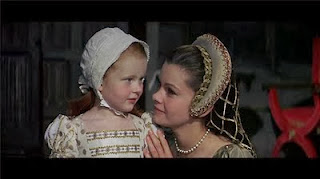 |
| Blood well spent: Anne of the Thousand Days |
Elizabeth was the daughter of King Henry VIII, infamous for his six wives and establishing the Church of England. A church established in order to divorce his first wife Katherine of Aragon so that he could then marry his second wife, Anne Boleyn.
 |
| The Queen's Mother: Anne Boleyn |
Henry married a further four times and did manage to have the son he desired with his third wife Jane Seymour, and Elizabeth was overlooked for the majority of her young life in favour of her brother. However, she was eventually restored to the succession with help from Henry's sixth wife, Katherine Parr, who took a kinder incentive towards Elizabeth, providing for her education and establishing her own belief in the Protestant faith. Katherine had even been left as regent of the kingdom when Henry went to war with France, showing Elizabeth that it was possible for a woman to rule in her own right.
 |
| The Lady Elizabeth Tudor |
Edward died in July 1553, which made her sister, Mary Tudor, Queen of England - the first Sovereign Queen in England's history. When Mary entered the city of London Elizabeth was with her, following her sister who triumphed over rebellions to prevent her ascension to the throne. Mary's reign began with a positive outlook, even with the sisters looking to heal old wounds. Unfortunately this did not last. After time questions of religion plagued Mary's reign, and completely destroyed any relationship the sisters once had when Elizabeth was placed in the tower and rigorously questioned in connection with rebellions by Thomas Wyatt, accusations which again had no basis of proof. The relationship between them never recovered and Mary died alone in 1558, defeated and loathed by the people.
Upon her death Elizabeth became the Queen of England. Her reign began with much upheaval and religious persecution that was eventually outlawed, with Elizabeth being more accepting of both Catholic and Protestant faiths, unlike her siblings. Over time Elizabeth established England as a powerful nation in its own right, her reign remembered as a golden age in English history. Elizabeth never married or produced an heir to carry on the Tudor name, she became known as The Virgin Queen; an icon and a mother to her people. England prospered under her rule, which is why she is admired to this day. Even in the face of adversity she proved her mettle; such as the Spanish Inquisition that looked to 'cleanse' England of heresy, an invasion that was unsuccessful despite the odds being in Spain's favour. Elizabeth I is remembered by many names - Good Queen Bess, Gloriana, The Virgin Queen. She overcame the odds to become the best loved of the Tudor Sovereigns.
Elizabeth became Anne's greatest triumph. As the prophetic and poignant scene proves, Anne's blood was indeed well spent.
No comments:
Post a Comment